Papers written by Hodgkin, Ernest P. (Doctor, b.1908 - d.1998) - Part 19
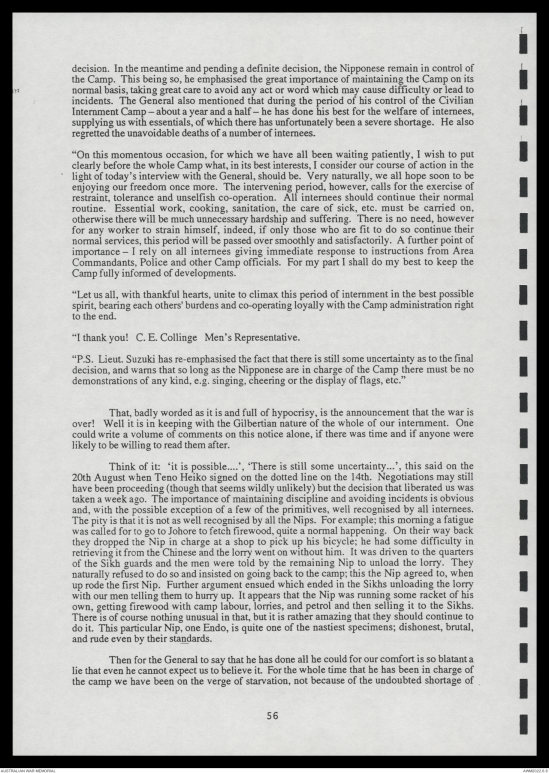
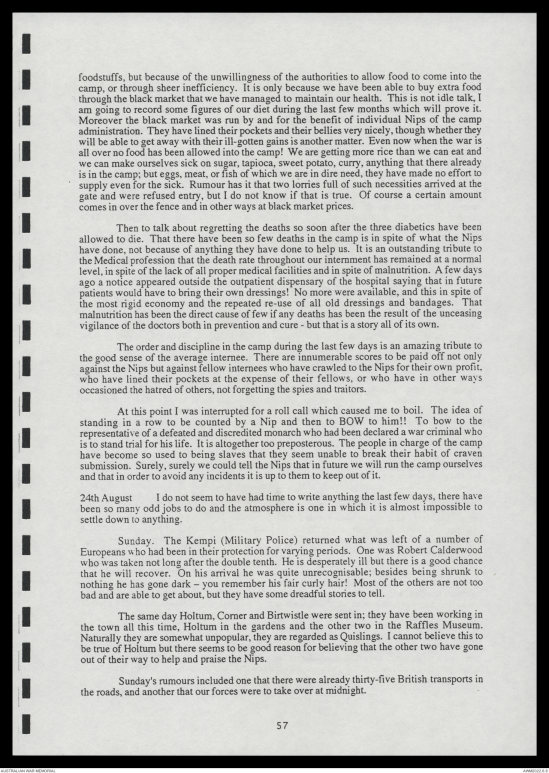
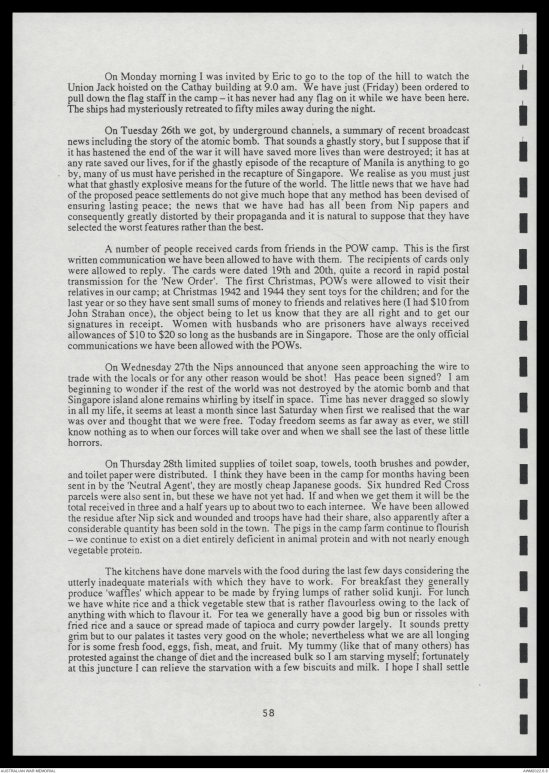
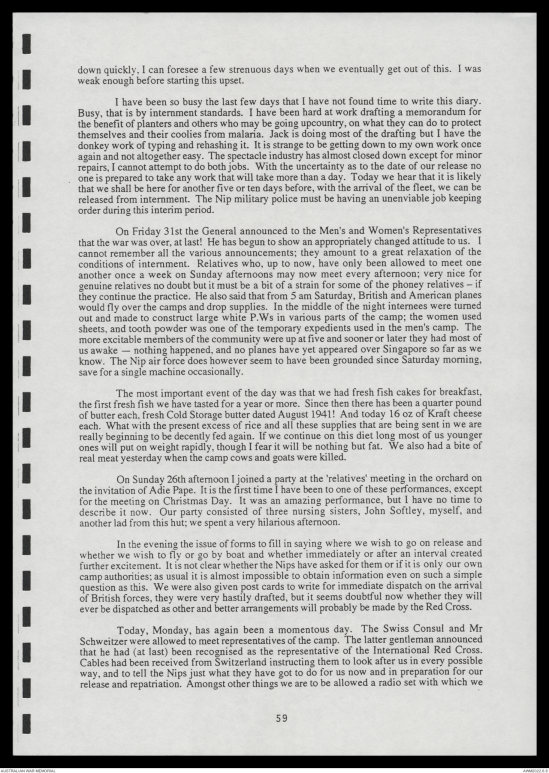
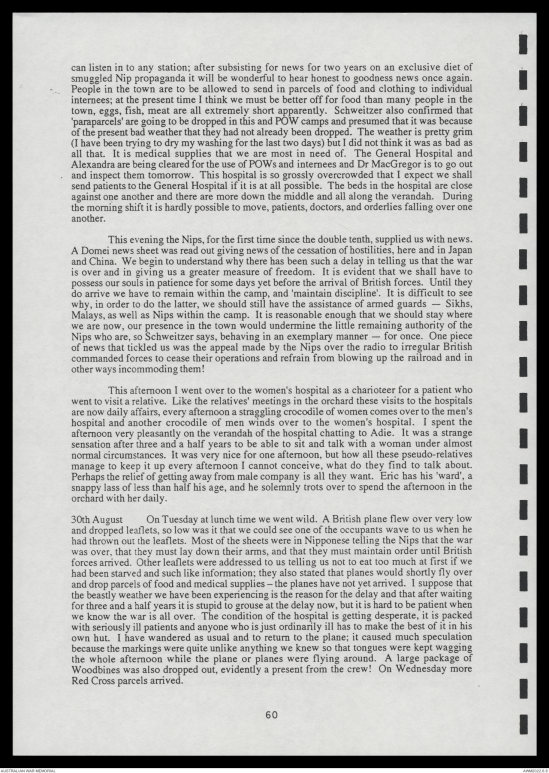
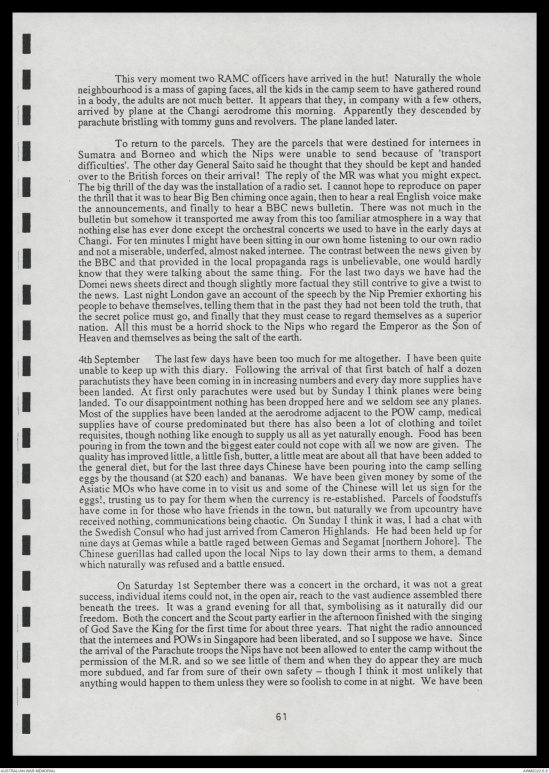
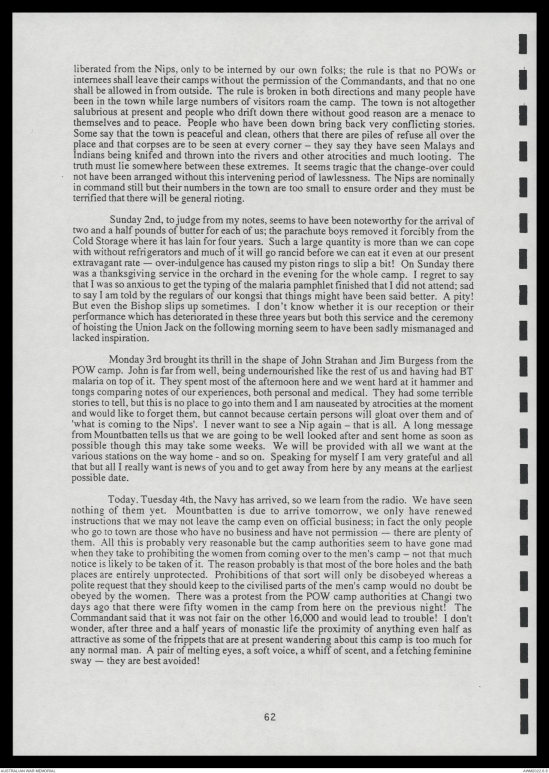
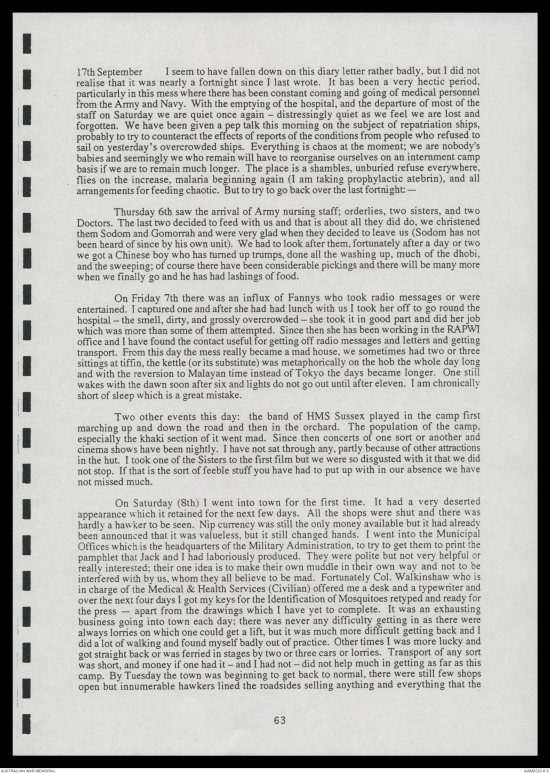
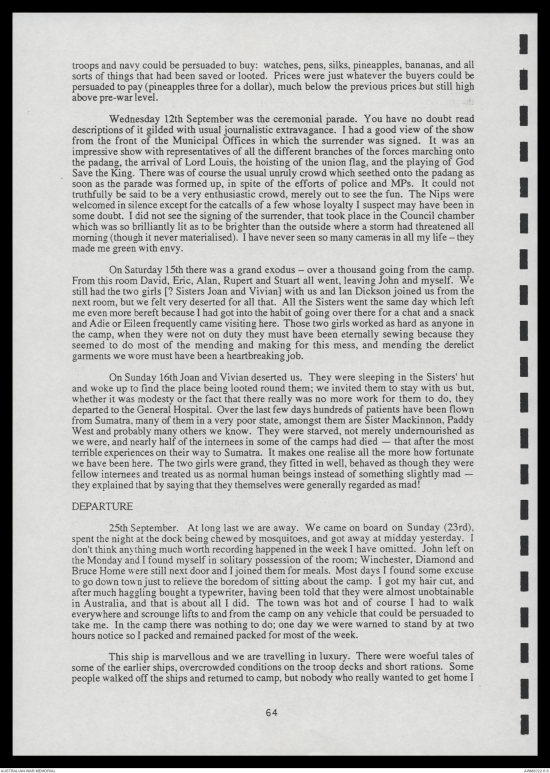
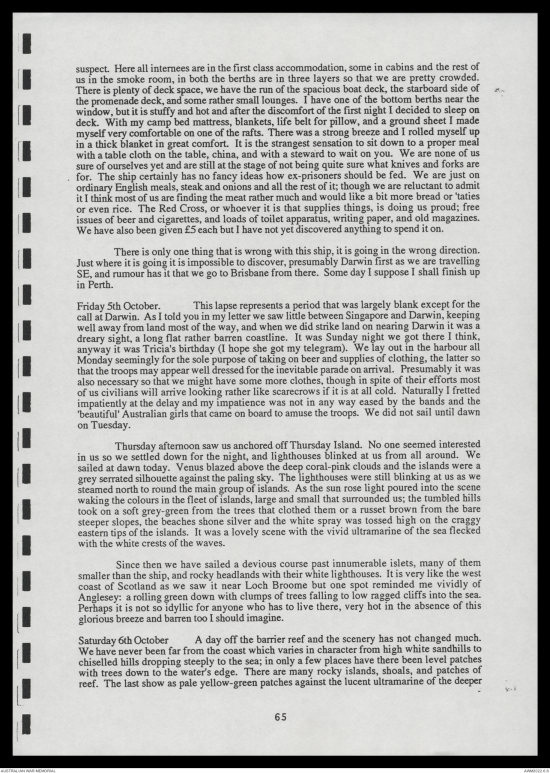
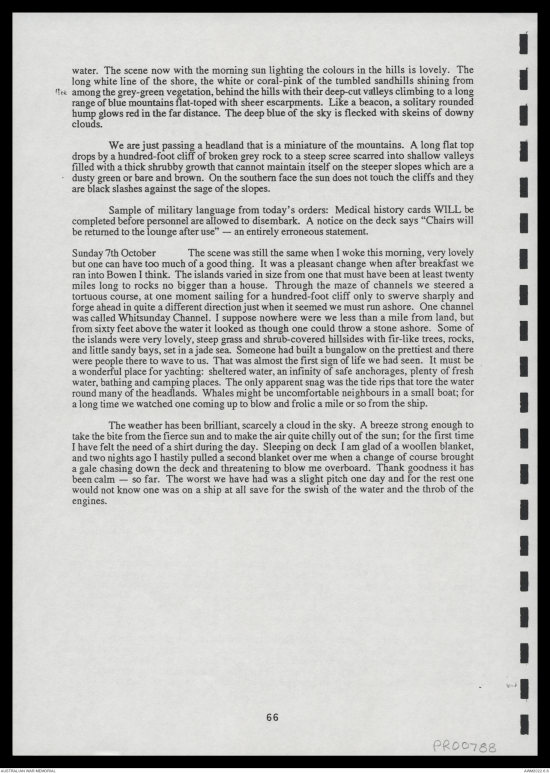
decision. In the meantime and pending a definite decision, The Nipponese remain in control of
the Camp. This being so, he emphasised the great importance of maintaining the Camp on its
normal basis, taking great care to avoid any act or word which may cause difficulty or lead to
incidents. The General also mentioned that during the period of his control of the Civilian
Internment Camp - about a year and a half- he has done his best for the welfare of internees,
supplying us with the essentials, of which there has unfortunately been a severe shortage. He also regretted the unavoidable deaths of a number of internees.
" On this momentous occasion, for which we have all been waiting patiently, I wish to put
clearly before the whole Camp what, in its best interests, I consider our course of action in the
light of today's interview with the General, should be. Very naturally , we all hope soon to be
enjoying our freedom once more. The intervening period, however, calls for the exercise of
restraint, tolerance and unselfish co-operation. All internees should continue their
normal routine. Essential work, cooking, sanitation, the care of sick, etc. must be carried on,
otherwise there will much unnecessary hardship and suffering. There is no need, however
for any worker to strain himself, indeed, if only those who are fit to do so continue their
normal services, this period will be passed over smoothly and satisfactorily. A further point of
importance - I rely on all internees giving immediate response to instructions from Area
Commandants. Police and other Camp officials. For my part I shall do my best to keep the
Camp fully informed of developments.
"Let us all, with thankful hearts, unite to climax this period of internment in the best possible
spirit, bearing each others' burdens and co-operating loyally with the Camp administration right to the end.
"I thank you! C. E. Collinge Men's Representative.
"P.S. Lieut. Suzuki has re-emphasised the fact that there is still some uncertainty as to the final
decision, and warns that so long as the Nipponese are in charge of the Camp there must be no
demonstrations of any kind, e.g. singing, cheering or the display of flags, etc."
That, badly worded as it is and full of hypocrisy, is the announcement that the war is
over! Well it is in keeping with the Gilbertian nature of the whole of our internment. One
could write a volume of comments on this notice alone, if there was time an if anyone were
likely to be willing to read them after.
Think of it: 'it is possible .....', 'There is still some uncertainty ...', this said on the
20th August when Tenko Heiko signed on the dotted line on the 14th. Negotiations may still
have been proceeding (though that seems wildly unlikely) but the decision that liberated us was
taken a week ago. The importance of maintaining discipline and avoiding incidents is obvious
and, with the possible exception of a few of the primitives, well recognised by all internees.
The pity is that it is not as well recognised by all the Nips. For example; this morning a fatigue
was called for to go to Johore to fetch firewood, quite a normal happening. On their way back
they dropped the Nip in charge at the shop to pick up his bicycle; he had some difficulty in
retrieving it from the Chinese and the lorry went on without him. It was driven to the quarters
of the Sikh guards and the men were told by the remaining Nip to unload the lorry. They
naturally refused to do so and insisted on going back to the camp; this the Nip agreed to, when
up rode the first Nip. Further argument ensued which ended up with the Sikhs unloading the lorry
with our men telling them to hurry up. It appears that the Nip was running some racket of his
own, getting firewood with camp labour, lorries and petrol and then selling it to the Sikhs.
There is of course nothing unusual in that, but it is rather amazing that they should continue to
do it. This articular Nip, one Endo, is quite one of the nastiest specimens; dishonest, brutal,
and rude even by their standards.
Then for the General to say he has done all that he could for our comfort is so blatant a
lie that even he cannot expect us to believe it. For the whole time that he has been in charge of
the camp we have been on the verge of starvation, not because of the undoubted shortage of
56
foodstuffs, but because of the unwillingness of the authorities to allow food to come into the
camp, or through sheer inefficiency. It is only because we have been able to buy extra food
through the blackmarket that we have managed to maintain our health. This is not idle talk, I
am going to record some figures of our diet over the last few months which will prove it.
Moreover the black market was run by and for the benefit of the individual Nips of the camp
administration. They have lined their pockets and their bellies very nicely, though whether they
will be able to get away with their ill-gotten gains is another matter. Even now when the war is
all over no food has been allowed into camp! We are getting more rice than we can eat and
we can make ourselves sick on sugar, tapioca, sweet potato, curry, anything that there already
is in the amp.; but eggs, meat or fish of which we are in dire need, they have made no effort to
supply even for the sick. Rumour has it that two lorries full of such necessities arrived at the
gate an were refused entry, but I do not know if that is true. Of course a certain amount
comes in over the fence and other ways at back market prices.
Then to talk about regretting the deaths so soon after the three diabetics have been
allowed to die. That there have been so few deaths in the camp in spite of what the Nips
have done, not because of anything they have done to hep us. It is an outstanding tribute to
the Medical profession that the death rate throughout the internment has remained at a normal
level, in spite of the lack of all proper medical facilities and in spite of malnutrition. A few days
ago a notice appeared outside the outpatients dispensary of the hospital saying that in future
patients would have to bring their own dressings! No more were available, and this in spite of
the most rigid economy an the repeated re-use of all old dressings and bandages. That
malnutrition has been the direct cause of few if any deaths has been the result of the unceasing
vigilance of the doctors both in prevention and cure- but that is a story all of its own.
The order and discipline in the camp during the last few days is an amazing tribute to
the good sense of the average internee. There are innumerable scores to be paid off not only
against the Nips but against fellow internees who have crawled to the Nips for their own profit,
who have lined their pockets at the expense of their fellows, or who have n other ways
occasioned the hatred of other, not forgetting the spies and traitors.
At this point I was interrupted for a roll call which caused me to boil. The idea of standing in a row to be counted by a Nip and then to BOW to him!! To bow to the representative of a defeated and discredited monarch who had been declared a war criminal who is to stand trial for his life. It is altogether too preposterous. The people in charge of
the camp have become so used to being slaves that they seem unable to break their habit of craven
submission. Surely, surely we could tell the Nips that in future we will run the camp ourselves and that in order to avoid any incidents it is up to them to keep out of it.
24th August I do not seem to have had time to write anything the last few days, there have been so many
odd jobs to do and the atmosphere is one in which it is almost impossible to settle down to anything.
Sunday. The Kempi (Military Police) returned what was left of a number of Europeans who had been in their protection for varying periods. One was Robert Calderwood who was taken not long after the double tenth. He is desperately ill but there is a good chance that he will recover. On his arrival he was quite unrecognisable; besides being shrunk to nothing he has gone dark - you remember his fair curly hair! Most of the others are not too bad and are able to get about, but they have some dreadful stories to tell.
The same day Holtum, Corner and Birtwistle were sent in; they have been working in the town all this time. Holtum in the gardens and the other two in the Raffles Museum. Naturally they are somewhat unpopular, they are regarded as Quislings. I cannot believe this to be true of Holtum but there seems to be good reason for believing that the other two have gone out of their way to help and praise the Nips.
Sunday's rumours included one that there were already thirty-five British transports in the roads, and another that our forces were to take over at midnight.
57
On Monday morning I was invited by Eric to go to the top of the hill to watch the Union Jack hoisted on the Cathay building at 9.0 am. We have just (Friday) been ordered to pull down the flag staff in the camp - it has never had any flag on it while we have been here. The ships had mysteriously retreated to fifty miles away during the night.
On Tuesday 26th we got, by underground channels, a summary of recent broadcast news including the story of the atomic bomb. That sounds a ghastly story, but I suppose that if it has hastened the end of the war it will have saved more lives than were destroyed; it has at any rate saved our lives, for if the
ghastly episode of the recapture of Manila is anything to go by, many of us must have perished in the recapture of Singapore. We realise as you must just what that ghastly explosive means for the future of the world. The little news that we have had of the proposed peace settlements do not give much hope that any method has been devised of ensuring lasting peace; the news that we have had has all been from Nip papers and consequently greatly distorted by their propaganda and it is natural to suppose that they have selected the worst features rather than the best.
A number of people received cards from friends in the POW camp. This is the first written communication we have been allowed to have with them. The recipients of the cards only were allowed to reply. The cards were dated 19th and 20th, quite a record in rapid postal transmission for the 'New Order'. The first Christmas, POW's were allowed to visit their relatives in our camp; at Christmas 1942 and 1944 they sent toys for the children;and for the
last year or so they have sent small sums of money to friends and relatives here (I had $10 from John Strahan once), the object being to let us know that they are all right and to get our signatures in receipt. Women with husbands who are prisoners have always received allowances of $10 to $20 so long as the husbands are in Singapore. Those are the only official communications we have been allowed with the POWs.
On Wednesday 27th the Nips announced that anyone seen approaching the wire to trade with the locals or for any other reason would be shot! Has peace been signed? I am beginning to wonder if the rest of the world was not destroyed by the atomic bomb and that Singapore island alone remains whirling by itself in space. Time has never dragged so slowly in all my life, it seems at least a month since last Saturday when first we realised that the war was over and thought that we were free. Today freedom seems as far away as ever, we still know nothing as to when our forces will take over and when we shall see the last of these little horrors.
On Thursday 28th limited supplies of toilet soap, towels, tooth brushes and powder, and toilet paper were distributed. I think they have been in the camp for months having been sent in by the 'Neutral Agent', they are mostly cheap Japanese goods. Six hundred Red Cross parcels were also sent in, but these we have not yet had. If and when we get them it will be the total received in three and a half years up to about two to each internee. We have been allowed the residue after Nip sick and wounded troops have had their share, also apparently after a
considerable quantity has been sold in the town. The pigs in the camp farm continue to flourish - we continue to exist on a diet entirely deficient in animal protein and with not nearly enough vegetable protein.
The kitchens have done marvels with the food during the last few days considering the utterly inadequate materials with which they have to work. For breakfast they generally produce 'waffles' which appear to be made by frying lumps of rather solid kunji. For lunch we have white rice and a thick vegetable stew that is rather flavourless owing to the lack of anything with which to flavour it. For tea we generally have a good big bun or rissoles with
fried rice and a sauce or spread made of tapioca and
curry powder largely. It sounds pretty grim but to our palates it tastes very good on the whole; nevertheless what we are all longing for is some fresh food, eggs, fish,meat,and fruit. My tummy (like that of many others) has protested against the change of diet and the increased bulk so I am starving myself; fortunately at this juncture I can relieve the starvation with a few biscuits and milk. I hope I shall settle
58
down quickly. I can foresee a few strenuous days when we eventually get out of this. I was
weak enough before starting this upset.
I have been so busy the last few days that I have not found time to write this diary. Busy, that is by internment standards. I have been hard at work drafting a memorandum for the benefit of planters and others who may be going upcountry, on what they can do to protect themselves and their coolies from malaria. Jack is doing most of the drafting but I have the donkey work of typing and rehashing it. It is strange to be getting down to my own work once
again and not altogether easy. The spectacle industry has almost closed down except for minor
repairs, I cannot attempt to do both jobs. With the uncertainty as to the date of our release no one is prepared to take any work that will take more than a day. Today we hear that it is likely that we shall be here for another five or ten days before, with the arrival of the fleet, we can be released from internment. The Nip military police must be having an unenviable job keeping order during this interim period.
On Friday 31st the General announced to the Men's and Women's Representatives that the war was over, at last! He has begun to show an appropriately changed attitude to us. I cannot remember all the various announcements; they amount to a great relaxation of the conditions of internment. Relatives who, up to now, have only been allowed to meet one
another once a week on Sunday afternoons may now meet every afternoon; very nice for genuine relatives no doubt but it must be a bit of a strain for some of the phoney relatives- if they continue the practice. He also said that from 5 am Saturday, British and American planes would fly over the camp and drop supplies. In the middle of the night internees were turned out and made to construct large white P.Ws in various parts of the camp; the women used sheets, and tooth powder was one of the temporary expedients used in the men's camp. The more excitable members of the community were up at five and sooner or later they had most of
us awake - nothing happened, and no planes yet appeared over Singapore so far as we know. The Nip air force does however seem to have been grounded since Saturday morning, save for a single machine occasionally.
The most important event of the day was that we had fresh fish cakes for breakfast, the first fresh fish we have tasted for a year or more. Since then there has been a quarter pound of butter each, fresh Cold Storage butter dated August 1941!And today 16 oz of Kraft cheese each. What with the present excess of rice and all these supplies that are being sent in we are really beginning to be decently fed again. If we continue on this diet long most of us younger ones will put on weight rapidly, though I fear it will be nothing but fat. We also had a bite of real meat yesterday when the camp cows and goats were killed.
On Sunday 26th afternoon I joined a party at the 'relatives 'meeting in the orchard on the invitation of Adie Pape. It is the first time I have been to one of these performances, except for the meeting on Christmas Day. It was an amazing performance, but I have no time to describe it now. Our party consisted of three nursing sisters, John Softley, myself, and
another lad from this hut; we spent a very hilarious afternoon.
In the evening the issue of forms to fill in saying where we wish to go on release and whether we wish to fly or go by boat and whether immediately or after an interval created further excitement. It is not clear whether the Nips have asked for them or if it is only our own camp authorities ; as usual it is almost impossible to obtain information even on such a simple question as this. We were also given post cards to write for immediate dispatch on the arrival of British forces, they were very hastily drafted, but it seems doubtful now whether they will ever be dispatched as other and better arrangements will probably be made by the Red Cross.
Today, Monday, has again been a momentous day. The Swiss Consul and Mr Schweitzer were allowed to meet representatives of the camp. The latter gentleman announced that he had (at last) been recognised as the representative of the International Red Cross. Cables had been received from Switzerland instructing them to look after us in every possible way, and to tell the Nips just what they have got to do for us now and in preparation for our release and repatriation. Amongst other things we are to be allowed a radio set with which we
59
can listen in to any station; after subsisting for news for two years on an exclusive diet of smuggled Nip propaganda it will be wonderful to hear honest to goodness news once again. People in the town are to be allowed to send in parcels of food and clothing to individual internees; at the present time I think we must be better off for food than many people in the town, eggs, fish, meat are all extremely short apparently. Schweitzer also confirmed that 'paraparcels' are going to be dropped in this and POW camps and presumed that it was because
of the present bad weather that they had not already been dropped. The weather is pretty grim
(I have been trying to dry my washing for the last two days) but I did not think it was as bad as all that.
It is medical supplies that we are most in need of. The General Hospital and Alexandra are being cleared for the use of POWs and internees and Dr MacGregor is to go out and inspect them tomorrow. This hospital is so grossly overcrowded that I expect we shall send patients to the General Hospital if it is at all possible. The beds in the hospital are close against one another and there are more down the middle and all along the verandah. During the morning shift it is hardly possible to move, patients, doctors, and orderlies falling over one another.
This evening the Nips, for the first time since the double tenth, supplied us with news. A Domei news sheet was read out giving news of the cessation of hostilities, here and in Japan and China. We begin to understand why there has been such a delay in telling us that the war is over and in giving us a greater measure of freedom. It is evident that we shall have to possess our souls in patience for some days yet before the arrival of British forces. Until they do arrive we have to remain within the camp, and 'maintain discipline'. It is difficult to see why, in order
to do the latter, we should still have the assistance of armed guards - Sikhs, Malays, as well as Nips within the camp. It is reasonable enough that we should stay where we are now, our presence in the town would undermine the little remaining authority of the Nips who are, so Schweitzer says, behaving in an exemplary manner - for once. One piece of news that tickled us was the appeal made by the Nips over the radio to irregular British commanded forces to cease their operations and refrain from blowing up the railroad and in other ways incommoding them!
This afternoon I went over to the women's hospital as a charioteer for a patient who went to visit a relative. Like the relatives' meetings in the orchard these visits to the hospitals are now daily affairs, every afternoon a straggling crocodile of women comes over to the men's hospital and another crocodile of men winds over to the women's hospital. I spent the afternoon very pleasantly on the
verandah of the hospital chatting to Adie. It was a strange sensation after three and a half years to be able to sit and talk with a woman under almost normal circumstances. It was very nice for one afternoon, but how all these pseudo-relatives manage to keep it up every afternoon I cannot conceive, what do they find to talk about. Perhaps the relief of getting away from male company is all they want. Eric has his 'ward', a snappy lass of less than half his age, and he solemnly trots over to spend the afternoon in the orchard with her daily.
30th August On Tuesday at lunch time we went wild. A British plane flew over very low and dropped leaflets, so low was it that we could see one of the occupants wave to us when he had thrown out the leaflets. Most of the sheets were in Nipponese telling the Nips that the war was over, that they must lay down their arms, and that they must maintain order until British forces arrived. Other leaflets were addressed to us telling us not to eat too much at first if we had been starved and such like information; they also stated that planes would shortly fly over and drop parcels of food and medical supplies - the planes have not yet arrived. I suppose that the beastly weather we have been experiencing is the reason for the delay and that after waiting for three and a half years it is stupid to grouse at the delay now, but it is hard to be patient when we know the war is all over. The condition of the hospital is getting desperate, it is packed with seriously ill patients and anyone who is just ordinarily ill has to make the best of it in his own hut. I have wandered as usual and to return to the plane; it caused much speculation because the markings were quite unlike anything we knew so that tongues were kept wagging the whole afternoon while the plane or planes were flying around. A large package of
Woodbines was also dropped out, evidently a present from the crew! On Wednesday more
Red Cross parcels arrived.
60
This very moment two RAMC officers have arrived in the hut! Naturally the whole neighbourhood is a mass of gaping faces, all the kids in the camp seem to have gathered round in a body, the adults are not much better. It appears that they, in company with a
few others, arrived by plane at the Changi aerodrome this morning. Apparently they descended by parachute bristling with tommy guns and revolvers. The plane landed later.
To return to the parcels. They are the parcels that were destined for internees in Sumatra and Borneo and which the Nips were unable to send because of 'transport difficulties'. The other day General Saito said he thought that they should be kept and handed over to the British forces on their arrival! The reply of the MR was what you might expect. The big thrill of the day was the installation of a radio set. I cannot hope to reproduce on paper the thrill that it was to hear Big Ben chiming once again, then to hear a real English voice make the announcements, and finally to hear a BBC news bulletin. There was not much in the bulletin but somehow it transported me away from this too familiar atmosphere in a way that nothing else has ever done except the orchestral concerts we used to have in the early days at Changi. For ten minutes I might have been sitting in our own home listening to our own radio and not a miserable, underfed, almost naked internee. The contrast between the news given by the BBC and that provided in the local propaganda rags is unbelievable, one would hardly know that they were talking about the same thing. For the last two days we have had the Domei news sheets direct and though slightly more factual they still contrive to give a twist to the news. Last night London gave an account of the speech by the Nip Premier exhorting his people to behave themselves, telling them that in the past they had not been told the truth, that the secret police must go, and finally that they must cease to regard themselves as a superior nation. All this must be a horrid shock to the Nips who regard the Emperor as the Son of Heaven and themselves as being the salt of the earth.
4th September The last few days have been too much for me altogether. I have been quite unable to keep us with this diary. Following the arrival of that first batch of half a dozen parachutists they have been coming in in increasing numbers and every day more supplies have been landed. At first only
parachutes were used but by Sunday I think planes were being landed. To our disappointment nothing has been dropped here and we seldom see any planes. Most of the supplies have been landed at the aerodrome adjacent to the POW camp, medical supplies have of course predominated but there has also been a lot of clothing and toile requisites, though nothing like enough to supply us all as yet naturally enough. Food has been pouring in from the town and the biggest eater could not cope with all we now are given. The quality has improved little, a little fish, butter, a little meat are about all that have been added to the general diet, but for the last
three days Chinese have been pouring into the camp selling eggs by the thousand(at $20 each) and bananas. We have been given money by some of the Asiatic MOs who have come in to visit us and some of the Chinese will let us sign for the eggs!., trusting us to pay for them when the currency is re-established. Parcels of foodstuffs have come in for those who have friends in the town, but naturally we from upcountry have received nothing, communications being chaotic. On Sunday I think it was, I had a chat with the Swedish Consul who had just arrived from Cameron Highlands. He had been held up for nine days at Gemas while a battle raged between Gemas and Segamat [northern Johore]. The Chinese guerillas had called upon the local Nips to lay down their arms to them, a demand which naturally was refused and a battle ensued.
On Saturday 1st September there was a concert in the orchard, it was not a great success, individual items could not, in the open air, reach to the vast audience assembled there beneath the trees. It was a grand evening for all that, symbolising as it naturally did our freedom. Both the concert and the Scout party earlier in the afternoon finished with the singing of God Save the King for the first time for about three years. That night the radio announced that the internees and POWs in Singapore had been liberated, and so I suppose we have. Since the arrival of the Parachute troops the Nips have not been allowed to enter the camp without the permission of the M.R. and so we see little of them and when they do appear they are much more subdued, and far from sure of their own safety - though I think it most unlikely that anything would happen to them unless they were so foolish to come in at night. We have been
61
liberated from the Nips, only to be interned by our own folks; the rule is that no POWs or internees shall leave their camps without the permission of the Commandants, and that no one shall be allowed in from outside. The rule is broken in both directions and many people have been in the town while large
numbers of visitors roam the camp. The town is not altogether salubrious at present and people who drift down there without good reason are a menace to themselves and to peace. People who have been down bring back very conflicting stories. Some say that the town is peaceful and clean, others that there are piles of refuse all over the place and that corpses are to be seen at every corner - they say they have seen Malays and Indians being knifed and thrown into the rivers and other atrocities and much looting. The truth must lie somewhere between these extremes. It seems tragic that the change-over could not have been arranged without this intervening period of lawlessness. The Nips are nominally in command still but their numbers in the town are too small to ensure order and they must be
terrified that there will be general rioting.
Sunday 2nd, to judge from my notes, seems to have been noteworthy for the arrival of two and a half pounds of butter for each of us; the parachute boys removed it forcibly from the Cold Storage where it has lain for four years. Such a large quantity is more than we can cope with without refrigerators, and much of it will go rancid before we can eat it even at our present extravagant rate - over-indulgence has caused my piston rings to slip a bit! On Sunday there
was a thanksgiving service in the orchard in the evening for the whole camp. I regret to say that I was so anxious to get the typing of the malaria pamphlet finished that I did not attend; sad to say I am told by the regulars of our kongsi that things might have been said better. A pity! But even the Bishop slips up sometimes. I don't know whether it is our reception or their performance which has deteriorated in these three years but both this service and the ceremony of hoisting the Union Jack on the following morning seem to have been sadly mismanaged and lacked inspiration.
Monday 3rd brought its thrill in the shape of John Strahan and Jim Burgess from the POW camp. John is far from well, being undernourished like the rest of us and having had BT malaria on top of it. They spent most of the afternoon here and we went hard at it hammer and tongs comparing notes of our experiences, both personal and medical. They had some terrible stories to tell, but this is no place to go into them and I am nauseated by atrocities at the moment and would like to forget them, but cannot because certain persons will gloat over them and of
'what is coming to the Nips'. I never want to see a Nip again - that is all. A long message from Mountbatten tells us that we are going to be well looked after and sent home as soon as possible though this may take some weeks. We will be provided with all we want at the various stations on the way home - and so on. Speaking for myself I am very grateful and all that but all I really want is news of you and to get away from here by any means at the earlies possible date.
Today, Tuesday 4th, the Navy has arrived, so we learn from the radio. We have seen nothing of them yet.
Mountbatten is due to arrive tomorrow, we only have renewed instructions that we may not leave the camp even on official business; in fact the only people who go to town are those who have no business and have not permission - there are plenty of them. All this is probably very reasonable but the camp authorities seem to have gone mad when they take to prohibiting the women from coming over to the men's camp - not that much notice is likely to be taken of it. The reason probably is that most of the bore holes and the bath places are entirely unprotected. Prohibitions of that sort will only be disobeyed whereas a polite request that they should keep to the civilised parts of the men's camp would no doubt be obeyed by the women. There was a protest from the POW camp authorities at Changi two days ago that there were fifty women in the camp from here on the previous night! The
Commandant said that it was not fair on the other 16,000 and would lead to trouble! I don't wonder, after three and a half years of monastic life the proximity of anything even half as attractive as some of the frippets that are at present wandering about this camp is too much for any normal man. A pair of melting eyes, a soft voice, a whiff of scent, and a fetching feminine sway - they are best avoided!
62
17th September I seem to have fallen down on this diary letter rather badly, but I did not realise that it was nearly a fortnight since I last wrote. It has been a very hectic period, particularly in this mess where there has been constant coming and going of medical personnel from the Army and Navy. With the emptying of the hospital, and the departure of most of the staff on Saturday we are quiet once again - distressingly quiet as we feel we are lost and
forgotten. We have been given a pep talk this morning on the subject of repatriation ships, probably to try to counteract the effects of reports of the conditions from people who refused to sail on yesterday's overcrowded ships. Everything is chaos at the moment; we are nobody's babies and seemingly we who remain will have to reorganise ourselves on an internment camp basis if we are to remain much longer. The place is a shambles, unburied refuse everywhere, flies on the increase, malaria beginning again (I am taking prophylactic atebrin), and all arrangements for feeding chaotic. But to try to go back over the last fortnight:-
Thursday 6th saw the arrival of Army nursing staff; orderlies, two sisters, and two Doctors. The last two decided to feed with us and that is about all they did do, we christened them Sodom and Gomorrah and were very glad when they decided to leave us (Sodom has not been heard of since by his own unit). We had to look after them, fortunately after a day or two we got a Chinese boy who has turned up trumps, done all the washing up, much of the dhobi,
and the sweeping; of course there have been considerable pickings and there will be many more when we finally go and he has had lashings of food.
On Friday 7th there was an influx of Fannys who took radio messages or were entertained. I captured one and after she had had lunch with us I took her off to go round the hospital - the smell,dirty, and grossly overcrowded - she took it in good part and did her job which was more than some of them attempted. Since then she has been working in the RAPWI office and I have found the contact useful for getting off radio messages and letters and getting transport. From this day the mess really became a mad house, we sometimes had two or three sittings at tiffin, the kettle (or its substitute) was metaphorically on the hob the whole day long and with the reversion to Malayan time instead of Tokyo the days became longer. One still wakes with the dawn soon after six and lights do not go out until after eleven. I am chronically short of sleep which is great mistake.
Two other events this day: the band of HMS Sussex played in the camp first marching up and down the road and then in the orchard. The population of the camp, especially the khaki section of it went mad. Since then concerts of one sort or another and cinema shows have been nightly. I have not sat through any, partly because of other attractions
in the hut. I took on of the Sisters to the first film but we were so disgusted with it that we did not stop. If that is the sort of feeble stuff you have had to put up with in our absence we have not missed much.
On Saturday (8th) I went into town for the first time. It had a very deserted appearance which it retained for the next few days. All the shops were shut and there was hardly a hawker to be seen. Nip currency was still the only money available but it had already been announced that it was valueless, but it still changed hands. I went into the Municipal Offices which is the headquarters of the Military Administration, to try to get them to print the pamphlet that Jack and I had laboriously produced. They were polite but not very helpful or really interested; their one idea is to make their own muddle in their own way and not to be interferred with by us, whom they all believe to be mad. Fortunately Col. Walkinshaw who is in charge of the Medical & Health Services (Civilian) offered me a desk and a typewriter and over the next four days I got my keys for the Identification of Mosquitoes retyped and ready for the press- apart from the drawings which I have yet to complete. It was an exhausting business going into town each day; there was never any difficulty getting in as there were
always lorries on which one could get a lift, but it was much more difficult getting back and I did a lot of walking and found myself badly out of practice. Other times I was more lucky and got straight back or was ferried in stages by two or three cars or lorries. Transport of any sort was short, and money if one had it - and I had not - did not help much in getting as far as this camp. By Tuesday the town was beginning to get back to normal, there were still few shops open but innumerable hawkers lined the roadsides selling anything and everything that the
63
troops and navy could be persuaded to buy; watches, pens, silks, pineapples, bananas, and all
sorts of things that had been saved or looted. Prices were just whatever the buyers could be persuaded to pay (pineapples three for a dollar), much below the previous prices but still high above pre-war level.
Wednesday 12th September was the ceremonial parade. You have no doubt read descriptions of it gilded with usual journalistic extravagance. I had a good view of the show from the front of the Municipal Offices in which the surrender was signed. It was an impressive show with representatives of all the different branches of the forces marching onto the padang, the arrival of Lord Louis, the hoisting of the union flag, and the playing of God Save the King. There was of course the usual unruly crowd which seethed onto the padang as soon as the parade was formed up, in spite of the efforts of police and MPs. It could not truthfully be said to be a very enthusiastic crowd, merely out to see the fun. The Nips were welcomed in silence except for the catcalls of a few whose loyalty I suspect may have been in some doubt. I did not see the signing of the surrender, that took place in the Council chamber which was so brilliantly lit as to be brighter than the outside where a storm had threatened all morning (though it never materialised). I have never seen so many cameras in all my life - they made me green with envy.
On Saturday 15th there was a grand exodus - over a thousand going from the camp. From this room David, Eric, Alan, Rupert and Stuart all went, leaving John and myself. We still had the two girls [?Sisters Joan and Vivian] with us and Ian Dickson joined us from the next room, but we felt very deserted for all that. All the Sisters went the same day which left
me even more bereft because I had got into the habit of going over there for a chat and a snack and Adie or Eileen frequently came visiting here. Those two girls worked as hard as anyone in the camp, when they were not on duty they must have been eternally sewing because they seemed to do most of the mending and making for this mess, and mending the derelict garments we wore must have been a heartbreaking job.
On Sunday 16th Joan and Vivian deserted us. They were sleeping in the Sisters' hut and woke up to find the place being looted round them; we invited them to stay with us but, whether it was modesty or the fact that there really was no more work for them to do, they departed to the General Hospital. Over the last few days hundreds of patients have been flown
from Sumatra, many of them in a very poor state, amongst them are Sister Mackinnon, Paddy West and probably many others we know. They were starved, not merely undernourished as we were, and nearly half of the internees in some of the camps had died - that after the most terrible experiences on their way to Sumatra. It makes one realise all the more how fortunate we have been here. The two girls were grand, they fitted in well, behaved as though they were fellow internees and treated us as normal human beings instead of something slightly mad - they explained that by saying that they themselves were generally regarded as mad!
DEPARTURE
25th September. At long last we are away. We came on board on Sunday (23rd), spent the night at the dock being chewed by mosquitoes, and got away at midday yesterday. I don't think anything much worth recording happened in the week I have omitted. John left on the Monday and I found myself in solitary possession of the room; Winchester, Diamond and Bruce Horne were still next door and I joined them for meals. Most days I found some excuse to go down just to relieve the boredom of sitting about the camp. I got my hair cut, and after much haggling bought a typewriter, having been told that they were almost unobtainable in Australia, and that is about all I did. The town was hot and of course I had to walk everywhere and scrounge lifts to and from the camp on any vehicle that could be persuaded to take me. In the camp there was nothing to do; one day we were warned to stand by at two hours notice so I packed and remained packed for most of the week.
This ship is marvellous and we are travelling in luxury. There were woeful tales of some of the earlier ships, overcrowded conditions on the troop decks and short rations. Some people walked off the ships and returned to camp, but nobody who really wanted to get home I
64
suspect. Here all internees are in the first class accommodation, some in cabins and the rest of
us in the smoke room, in both the berths are in three layers so that we are pretty crowded. There is plenty of deck space, we have the run of the spacious boat deck, the starboard side of the promenade deck, and some rather small lounges. I have one of the bottom berths near the window, but it is stuffy and hot and after the discomfort of the first night I decided to sleep on deck. With my camp bed mattress, blankets, life belt for pillow, and a ground sheet I made myself very comfortable on one of the rafts. There was a strong breeze and I rolled myself up in a thick blanket in great comfort. It is the strangest sensation to sit down to a proper meal with a table cloth on the table, china, and with a steward to wait on you. We are none of us sure of ourselves yet and are still at the stage of not being quite sure what knives and forks are for. The ship certainly has no fancy ideas how ex-prisoners should be fed. We are just on ordinary English meals, steak and onions and all the rest of it; though we are reluctant to admit it I think most of us are finding the meat rather much and would like a bit more bread or 'taties or even rice. The Red Cross, or whoever it is that supplies things, is doing us proud; free issues of beer and cigarettes, and loads of toilet apparatus, writing paper, and old magazines. We have also been given £5 each but I have not yet discovered anything to spend it on.
There is only one thing that is wrong with this ship, it is going in the wrong direction. Just where it is going it is impossible to discover, presumably Darwin first as we are travelling SE, and rumour has it that we go to Brisbane from there. Some day I suppose I shall finish up in Perth.
Friday 5th October. This lapse represents a period that was largely blank except for the call at Darwin.
As I told you in my letter we saw little between Singapore and Darwin, keeping well away from land most of the way, and when we did strike land on nearing Darwin it was a dreary sight, a long flat rather barren coastline. It was Sunday night we got there I think, anyway it was Tricia's birthday (I hope she got my telegram). We lay out in the harbour all
Monday seemingly for the sole purpose of taking on beer and supplies of clothing, the latter so that the troops may appear well dressed for the inevitable parade on arrival. Presumably it was also necessary so that we might have some more clothes, though in spite of their efforts most of us civilians will arrive looking rather like scarecrows if it is at all cold. Naturally I fretted impatiently at the delay and my impatience was not in any way eased by the bands and the 'beautiful' Australian girls that came on board to amuse the troops. We did not sail until dawn on Tuesday.
Thursday afternoon saw us anchored off Thursday Island. No one seemed interested in us so we settled down for the night, and lighthouses blinked at us from all around. We sailed at dawn today. Venus blazed above the deep coral-pink clouds and the islands were a grey serrated silhouette against the paling sky. The lighthouses were still blinking at us as we steamed north to round the main group of islands. As the sun rose light poured into the scene
waking the colours in the fleet of islands, large and small that surrounded us; the tumbled hills took on a soft grey-green from the trees that clothed them or a russet brown from the bare steeper slopes, the beaches shone silver and the white spray was tossed high on the craggy eastern tips of the islands. It was a lovely scene with the vivid ultramarine of the sea flecked with the white crests of the waves.
Since then we have sailed a devious course past innumerable islets, many of them smaller than the ship, and rocky headlands with their white lighthouses. It is very like the west coast of Scotland as we saw it near Loch Broome but one spot reminded me vividly of Anglesey; a rolling green down with clumps of trees falling to low ragged cliffs into the sea. Perhaps it is not so idyllic for anyone who has to live there, very hot in the absence of this glorious breeze and barren too I should imagine.
Saturday 6th October A day off the barrier reef and the scenery has not changed much. We have never been far from the coast which varies in character from high white sandhills to chiselled hills dropping steeply to the sea; in only a few places have there been level patches with trees down to the water's edge. There are many rocky islands, shoals, and patches of reef. The last show as pale yellow-green patches against the lucent ultramarine of the deeper
65
water. The scene now with the morning sun lighting the colours in the hills is lovely. The long white line of the shore, the white or coral-pink of the tumbled sandhills shining from among the grey-green vegetation, behind the hills with their deep-cut valleys climbing to a long range of blue mountains flat-toped with sheer escarpments. Like a beacon, a solitary rounded hump glows red in the far distance. The deep blue of the sky is flecked with skeins of downy clouds.
We are just passing a headland that is a miniature of the mountains. A long flat top drops by a hundred-foot cliff of broken grey rock to a steep scree scarred into shallow valleys filled with a thick shrubby growth that cannot maintain itself on the steeper slopes which are a dusty green or bare and brown. On the southern face the sun does not touch the cliffs and they are black slashes against the sage of the slopes.
Sample of military language from today's orders: Medical history cards WILL be completed before personnel are allowed to disembark. A notice on the deck says "Chairs will be returned to the lounge after use" - an entirely erroneous statement.
Sunday 7th October The scene was still the same when I woke this morning, very lovely but one can have too much of a good thing. It was a pleasant change when after breakfast we ran into Bowen I think. The islands varied in size from one that must have been at least twenty miles long to rocks no bigger than a house. Through the maze of channels we steered a tortuous course, at one moment sailing for a hundred-foot cliff only to swerve sharply and
forge ahead in quite a different direction just when it seemed we must run ashore. One channel was called Whitsunday Channel. I suppose nowhere were we less than a mile from land, but from sixty feet above the water it looked as though one could throw a stone ashore. Some of the islands were very lovely, steep grass and shrub-covered hillsides with fir-like trees, rocks, and little sandy bays, set in a jade sea. Someone had built a bungalow on the prettiest and there were people there to wave to us. That was almost the first sign of life we had seen. It must be
a wonderful place for yachting; sheltered water, an infinity of safe anchorages, plenty of fresh water, bathing and camping places. The only apparent snag was the tide rips that tore the water round many of the headlands. Whales might be uncomfortable neighbours in a small boat; for a long time we watched one coming up to blow and frolic a mile or so from the ship.
The weather has been brilliant, scarcely a cloud in the sky. A breeze strong enough to take the bite from the fierce sun and to make the air quite chilly out of the sun; for the first time I have felt the need of a shirt during the day. Sleeping on deck I am glad of a woollen blanket, and two nights ago I hastily pulled a second blanket over me when a change of course brought a gale chasing down the deck and threatening to blow me overboard. Thank goodness it has been calm - so far. The worst we have had was a slight pitch one day and for the rest one would not know one was on a ship at all save for the swish of the water and the throb of the engines.
66
PR00788
 Sam scott
Sam scottThis transcription item is now locked to you for editing. To release the lock either Save your changes or Cancel.
This lock will be automatically released after 60 minutes of inactivity.